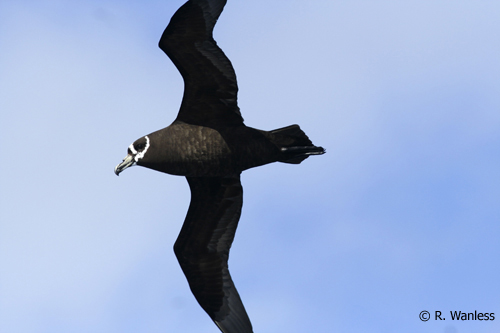Tim Reid (FitzPatrick Institute, University of Cape Town, South Africa) and colleagues, writing in the journal Antarctic Science, report on satellite-tracking ACAP-listed Spectacled Petrels Procellaria conspicillata at sea.

Spectacled Petrel. Photograph by Ross Wanless
The paper’s abstract follows:
“Satellite transmitters were attached to eight adult spectacled petrels Procellaria conspicillata Gould captured during the early incubation period at their breeding grounds on Inaccessible Island, one of the Tristan da Cunha Islands in the central South Atlantic Ocean. Data on their at-sea distribution was obtained for up to six months. All birds remained within the South Atlantic from 24–44°S, with most between 25 and 40°S. Breeding birds mainly foraged in oceanic waters, but failed breeders or non-breeders concentrated their foraging activity over the Rio Grande Rise and the Walvis Ridge and along the shelf break off the east coast of South America. Little foraging occurred along the Benguela shelf break off southern Africa. Non-breeders favoured relatively warm water with low chlorophyll concentrations, reducing the risk of bycatch in fisheries. Tracked birds spent 16% of their time in areas with high levels of tuna longline fishing activity, with overlap greater for non-breeding birds (22%) than breeding birds (3%). Birds in this study foraged in shallower waters along the continental shelf edge off South America than spectacled petrels tracked in this area in winter, potentially increasing their risk of exposure to demersal longline fisheries in this area in summer.”
Reference:
Reid, T.A., Ronconi, R.A., Cuthbert, R.J. & Ryan, P.G. 2013. The summer foraging ranges of adult spectacled petrels Procellaria conspicillata. Antarctic Science doi: 10.1017/S0954102013000266.
John Cooper, ACAP Information Officer, 2 June 2013

 English
English  Français
Français  Español
Español